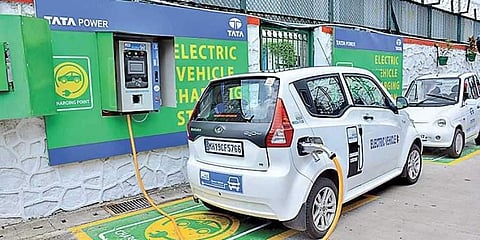

Despite getting relief on the Goods and Services Tax (GST) front, electric vehicle (EV) makers feel an inverted duty structure could impede growth. The manufacturers have sought a correction so that the overall cost of vehicles could be brought down to push the EV industry which is presently at a nascent stage in the country.
The GST rate on all EVs has been reduced recently from 12 to 5 per cent. Additionally, the tax rate on chargers or charging stations for EVs has been slashed from 18 to 5 per cent. However, the EV makers are of the view that the Centre should review the current taxation framework on raw materials, especially battery packs.
“The recent directives are undoubtedly in line with the vision to increase the adoption of EVs in India, however, the vital issue that hasn’t yet been talked about is the duty on imported raw materials, chiefly, battery packs —the engine in an electric-powered vehicle,” Hero Electric MD Naveen Munjal told this publication.
He added, “the original equipment manufacturers (OEMs) majorly import battery packs and as manufacturers, we expect the government to slash the five per cent duty on them to nil. This duty is only going to increase the overall cost of EVs, which will act as a double-edged sword as the cost will be borne by customers and thus would not help reduce the price parity between EV and internal combustion engine vehicles.”
There is an inherent inverted duty structure (situation where import duty on finished goods is low compared to import duty on raw materials) as the GST input on raw materials and other overheads are on average of 18 per cent wherein the output is going to be pegged at five per cent, according to experts. The biggest hurdle in the way of expanding this industry in India is non-existent of EV ecosystem — from charging infrastructure to manufacturing of critical component supply like battery cells, motors and controllers, they feel.
Avan Motors India, Business Head Pankaj Tiwari told this publication: “GST on purchase of spare parts is still in the range of 18 to 28 per cent. OEMs are paying more GST on purchase of raw materials and getting lower GST on selling. Hence, the working capital gets blocked due to higher tax paid in buying raw materials.” He further suggested there is still some balancing act needs to be done in the demand-supply miss match so that the manufacturers can reap benefits in the production side over a span of time.
Once the industry reaches stability in terms of EVs acceptability, the idea of increasing duties on such components in a phased manner will be more ideal, Munjal concluded.